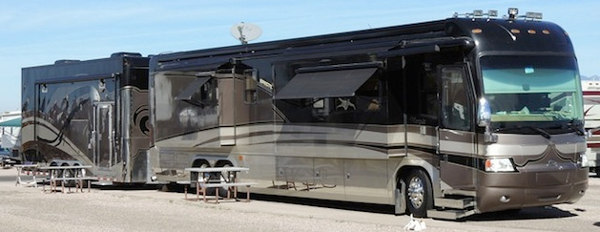Escaped Doodles
How? How would I do That?

It should be so simple, just get in the RV and drive away. But there are details that make it not quite so simple. Once you do it, looking back, it doesn't seem so bad. But looking forward all the details can be overwhelming.
A Google search will give a plethora of guidance and stories from people who have done it. I highly recommend spending a lot of time reading these. No one source will give you all you need, and your circumstances will be different than anyone else. You need to digest all these ideas and convert them from information to knowledge for you. But, here are a few of the elements we considered in starting a Fulltime Life.
All this information is for US citizens, I know nothing about other countries.
Domicile

A domicile, according to Wikipedia is "In law, domicile is the status or attribution of being a lawful permanent resident in a particular jurisdiction. A person can remain domiciled in a jurisdiction even after he has left it, if he has maintained sufficient links with that jurisdiction or has not displayed an intention to leave permanently." For a Fulltime traveler it's the place s/he intends to return to when away.
Legally a domicile is important for taxes, insurance, wills, voting, etc. A Fulltime traveler may pick any US state for their domicile, particularly if they don't know where they will settle when done Fulltiming. We all already have a domicile, but may want to consider changing it for Fulltiming. It is likely that some states offer lower taxes, vehicle registration fees and insurance rates than the state now domiciled in. Florida, Texas and South Dakota are easiest to set up domicile in and friendly towards Fulltimers.
Setting up domicile requires creating links to ones new state and negating links to the old state. If ties aren't cut the old state may come looking for taxes, etc.

One important element to setting up a new domicile is to have your permanent address in the new state. For Fulliming the easiest way to do this is by obtaining a "Personal Mail Box" in your new home state. This gives a legal street address and the company providing the PMB will periodically forward mail to you wherever you are. It also serves as your permanent address for licenses, registration, insurance, banks, bills, etc.
It's advised to obtain a PMB early in the process. This gives you time to transfer important mailings to your new address. It is best to keep track of mail received for 6 months, or better a year, so you'll know who you want/need to give the new address to.
Remember it costs to have your mail forwarded, so it is advantageous to minimize paper mail received. Also, forwarding takes an extra week or so. It is worth the effort to set up as much as possible using automatic bill pay and email. Most institutions prefer to use e-mail and direct deposit/withdrawl as it saves them the cost of mailings. It was suggested to not initiate mail forwarding which cuts down on a lot of junk mail at the new address.
Finances

For the most part it's as simple as an on line address change. However, some institutions will not recognize a PMB physical address for ones main address. This is tied to the Patriot Act but is not true to that Acts wording. There is no use arguing with these large bureaucracies though. They demand an address other than ones PMB. Fortunately the Patriot Act allows using a family or friends address.
Banks generally will accept a PMB address. A change of address and new checks should suffice. The bank, or banks, should have good national coverage in having lots of branches, but could be a bank tailored to on-line access. Banks for Fulltimers should have good on-line access as well as easily used bill pay.
Finally, it is much easier to fulltime if you are debt free. The cost of payments and/or interest is a killer. Highly recommended to be debt free with some money in the bank before starting.
Stuff

One big stumbling block is all the stuff. To thin this down and go Fulltime isn't difficult to get ones head around, but doing it takes a lot of effort and some tough decisions. First it is heart wrenching to "discard" the things saved over many years. But once the sort is done don't backslide, once it's slated to go it should go. Don't re-think. It is recommended to keep nothing that doesn't fit into the RV, to not keep a storage unit.
Tips:
- Hire a Realtor to sell any high dollar property, like your house. Set a reasonable valuation.
- Hire a responsible estate sale company/person to sell any stuff you don't plan to keep.
- Be ruthless in what you intend to dispose of. Keep the minimum.
Medical

Health insurance is a problem for everyone in the US. If it comes with ones job, it takes a big chunk out of the pay check. If it's not an employment benefit it's hard to obtain and expensive. Private insurance is more and more tied to HMOs which provide little coverage outside a given region. For Fulltimers under the age of Medicare this is a big problem. If Medicare eligible it become more manageable.
If considering fulltiming before Medicare eligibility think carefully about health coverage. It may be a large consideration in which state to domicile in.
Finding doctors for Fulltime travel is tricky. In an emergency the hospital emergency room, immediate care or 911 works. But for a family practitioner, yearly exams and prescription refills sticking with one physician is best. This leads to traveling to one location for appointments at least yearly. The doctor could be one seen before traveling or one in a location visited frequently.
Bills
Most bills can be taken care of through a banks automatic withdrawl and bill pay. This should account for 90 plus percent of bills. For those bills that need to be sent to a mailing address you can use your PMB. This works fine but note the one to two week delay in getting bills.
Internet

Internet has become indispensable. It's used for banking, communications, shopping, etc. There are two main methods to obtain Internet on the road. The first is WiFi. Most private campgrounds offer WiFi, usually free, to guests. This is of varying quality and speed. Two elements determine the usefulness of a WiFi signal. The first is the strength of the WiFi to ones RV, the number of bars. This determines if you can get a usable signal. Second is the connection of the RV Parks link to the Internet. This determines the throughput possible for all users. You may have a great WiFi connection but if the "pipe" to the Internet is overloaded, or just too small, data can only be passed slowly. It might give good speed in the morning but bog down early evening when everyone in the park is trying to use it.
The second method is to use cell phone technology to connect to the Internet. If there is adequate cell coverage this method is fast and works well. However, there is a charge for the data transferred via a cell device. A cell plan usually allows a given amount of data. If that data allotment is exceeded the connection either slows dramatically or stops working. Cell usage is relatively expensive but reliable.
A WiFi booster can be used to enhance a WiFi signal. This can greatly improve the WiFi linkage in a campground. However, it does nothing for the "pipe" to the Internet. If the connection offers too little bandwidth a booster won't help you.
Cell connections are usually through a smart phone or hotspot (MiFi) device. Smart phones are becoming quite useful themselves and directly connect to the cell network. (Smart phones can connect to a WiFi network directly) A smart phone can also be tethered to a computer to provide an Internet connection. A hotspot can set up a WiFi network from a cell connection.
A cell booster can be used to boost and re-broadcast the signal. They can help with a weak cell signal, but can' make a signal from nothing.
For a great resource for Internet on the road check out Technomadia. They keep track of mobile Internet equipment and services for a living, good stuff. We joined their inner sanctum and gained a lot of knowledge through it. Their blog is also a good read.
RV

You can find all kinds of recommendations on-line for a fulltime RV. Read some of the fulltime forums or Google for specifics. One can find a recommendation for any RV type and size desired. Personal taste and travel style are paramount.
I'll pass along one recommendation I've read which makes sense. Buy a used RV for your first fulltime vehicle. You'll likely not know what you want until you've done it awhile. So the first RV bought will likely not be ideal and you'll buy a second. Thus, the big hit for depreciation of a new RV is avoided. But if you already have an RV, use it.
Insurance will likely be through an agent in ones new state. They'll know the ins and outs of that state and give knowledgeable service.
Legal
Having wills and health directives is a good idea. This is true whether you're traveling fulltime or not.